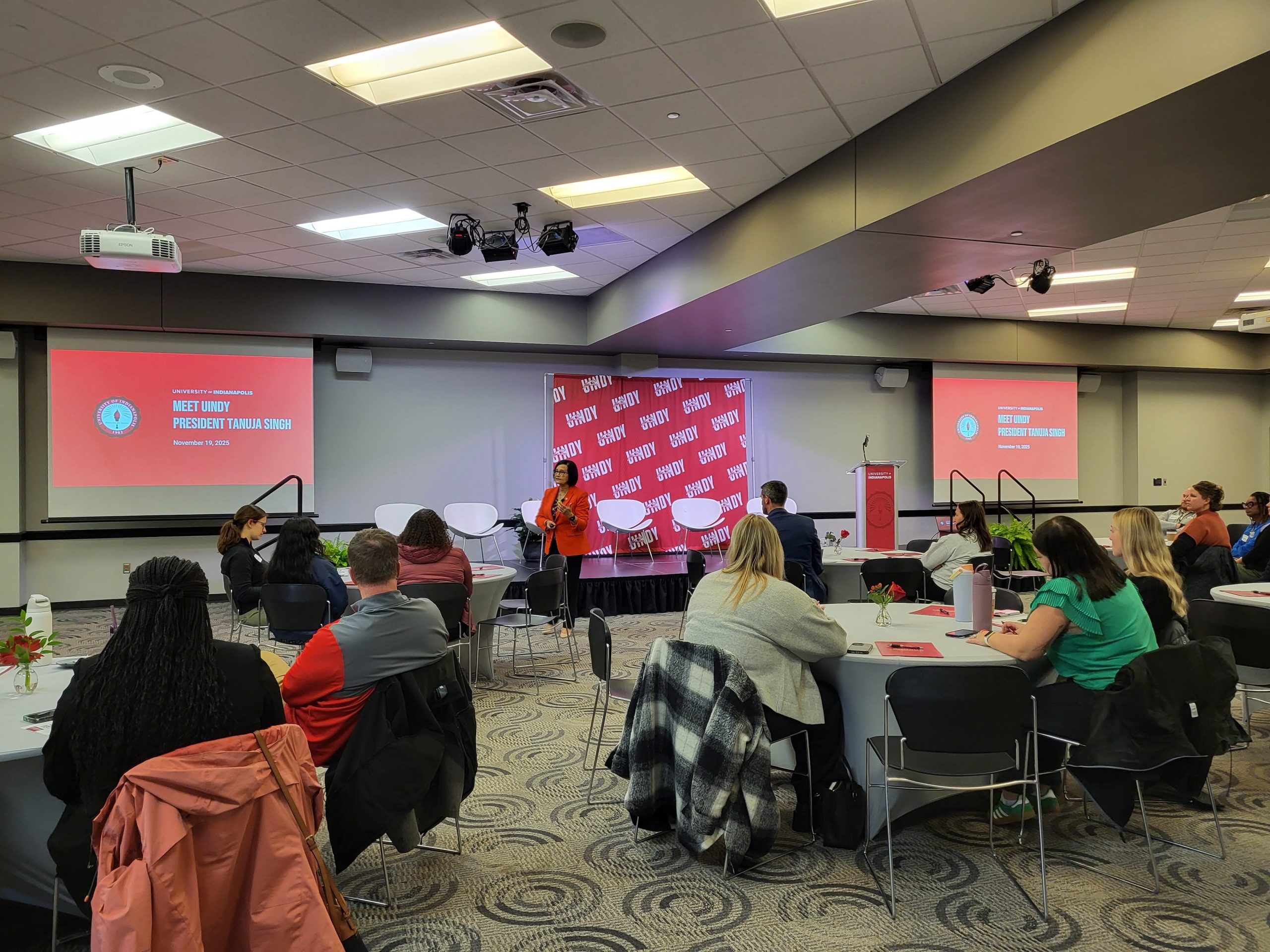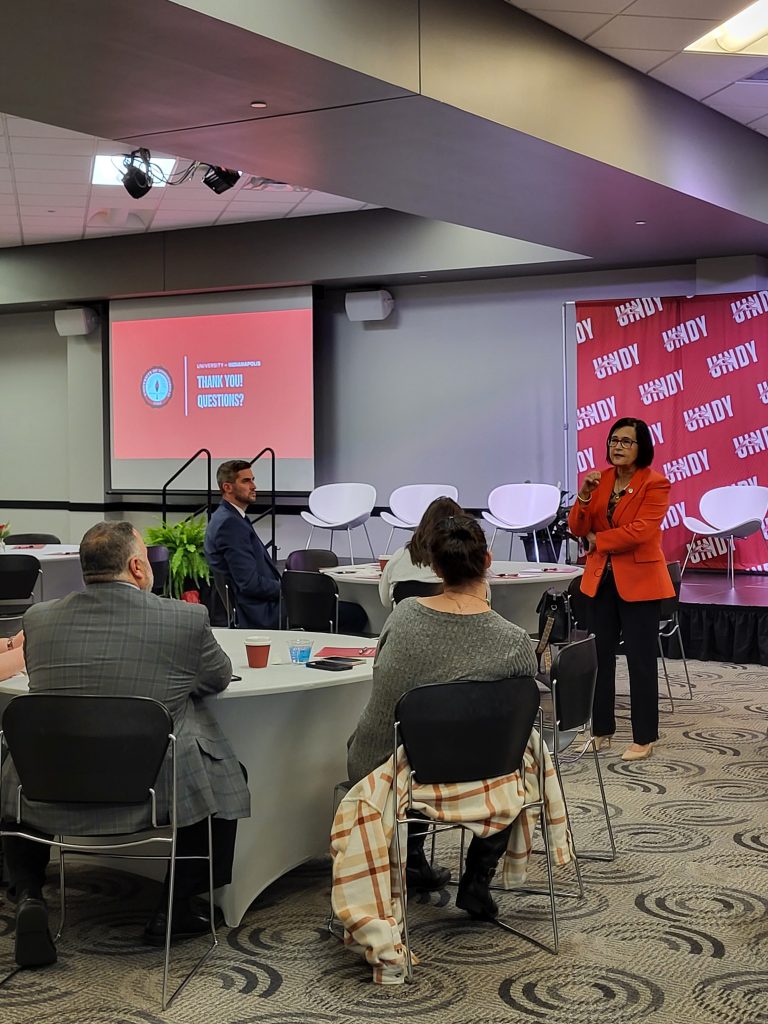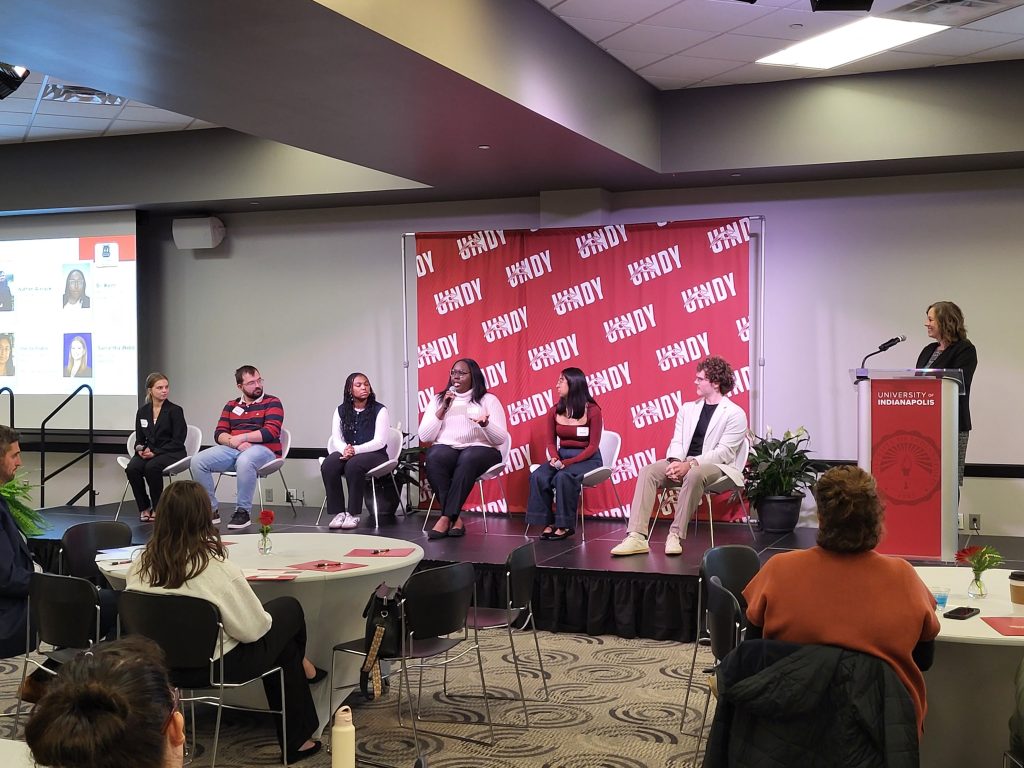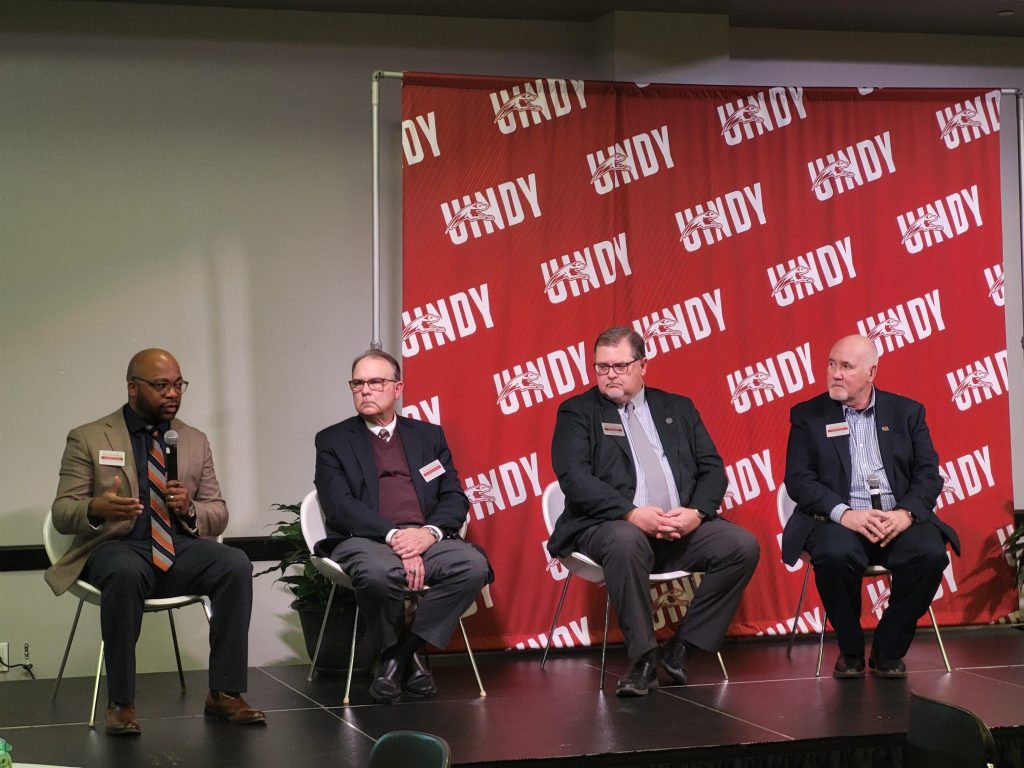Connecting Students, Employers, and Industry at Meet UIndy

The Stephen F. Fry Professional Edge Center hosted more than 30 organizations at the University of Indianapolis for Meet UIndy, an event dedicated to helping employers connect with and recruit UIndy students and graduates.
“At UIndy, we want every employer to feel welcome on our campus,” said Jessica Sremanak, director of employer engagement. “We’re eager to partner with organizations of all sizes to create meaningful experiences for students—whether through events, internships, or customized programs that connect learners with your talent needs.”
Keynote from Dr. Tanuja Singh
In her keynote address, University President Dr. Tanuja Singh emphasized the critical need for Indiana employers and universities to not only develop strong talent but also retain it within the state.

“Indiana is among the top 10 states in attracting people for educational opportunities, but in the bottom when it comes to keeping people here,” said Dr. Singh. “UIndy, on the other hand, prepares students to stay. More than 80% of our students choose to live and work in Indiana after graduation.”
She noted that retention is even stronger when students intern with Indiana employers, underscoring the importance of early engagement and partnership.
Dr. Singh outlined the University’s efforts to continue to be responsive to today’s talent needs by expanding flexible learning options, creating stackable and industry-aligned credentials, and embedding experiential learning across all programs. Examples included the Roche Academy partnership, the Women’s Executive Leadership Institute, the rapid integration of artificial intelligence into the business curriculum, and new certificate and online offerings designed for learners at all stages through UIndy Online and the Sease Institute.
Dr. Singh also highlighted UIndy’s strengths, including strong job placement outcomes above national averages, global diversity, and standout academic programs in engineering, business, healthcare, and unique specialties like forensic anthropology. She emphasized that every undergraduate student completes an experiential learning requirement, ensuring they graduate career-ready.
“UIndy is talent-focused; we are Indiana-focused,” she said. “We are a comprehensive university. We have everything from healthcare to engineering to very niche areas like forensic anthropology and aging studies. Two years ago we updated our mission and vision statements to address not just the traditional college experience of 18-year-olds, but to talk about the learners of today and tomorrow. It’s not about how we teach; it’s about how people learn.
“College education is not just an indicator of economic prosperity,” she continued. “College-educated populations have higher healthcare outcomes, greater socioeconomic outcomes, and better mental health outcomes, all of which contribute to the economy. Our state requires people to be educated, not just for the workforce of today, but for what’s coming years from now.”
What Today’s Students Want from Employers
Following Dr. Singh’s keynote address, a panel of UIndy students—representing a variety of academic programs and experiences—shared their perspectives on interacting with employers and navigating internship and job searches.

The panel consisted of:
- Nathan Almack ’25 (Psychology)
- Sydney Hearn ’27 (Education)
- Bri Kent ’26 (Social Work)
- Drew McClure ’26 ’27 (Finance, MBA)
- Imelda Pozos ’25 ’27 (History, Political Science, MA in Applied Sociology)
- Samantha Webb ’29 (Marketing)
To begin the discussion, Sremanak posed a series of statements and asked students to raise their hands if they agreed.
“You’ve been ghosted by a recruiter.”
All six students raised their hands.
“Company culture is more important to you than salary.”
Again, all six students raised their hands.
“You’d prefer to receive a text rather than an email from a recruiter.”
None of the students raised their hands.
“I get a lot of spam calls and texts,” explained Webb. “But I check my email five or six times a day, so receiving an email is way better for me. Plus, emails have everything—dates, times, details—all written out for you, instead of a phone call where you have to write that down yourself.”
A major theme that emerged from the panel was the importance of company culture and the availability of mentorship opportunities.
“For me, one of the most important things would be mentorship,” said Pozos. “I want to go into a job knowing the environment and company support me. Another really, really important thing is making sure that the mission and values of the company align with my personal values and seeing those values implemented in day-to-day operations.”
“I think salaries are always going to be a consideration, but it really comes down to the culture and the people,” added McClure. “It’s people first, no matter what sector you’re in. It comes down to development and what you’re pouring back into your talent.”
Additional insights from the panel included that students and recent graduates:
- Use TikTok and Instagram, in addition to more traditional platforms like LinkedIn and Handshake, to explore job and internship opportunities.
- Prefer open-ended interview questions, such as “Tell me about yourself” or “What are your strengths and weaknesses?” because they offer space to show personality and highlight strengths.
- Want employers to connect more frequently with smaller universities like UIndy.
What Employers Need And How UIndy Delivers
After hearing directly from students, employers then heard from the deans of UIndy’s colleges and schools, who shared how the University partners with organizations and maintains a market-responsive curriculum across all programs.

Panelists included:
- Dr. Brent Arnold, dean of the College of Health Sciences
- Dr. Karl Knapp, dean of the School of Business
- Dr. John Kuykendall, dean of the College of Education and Behavioral Sciences
- Dr. Travis Miller, dean of the Shaheen College of Arts & Sciences
Dr. Miller highlighted the Shaheen College of Arts & Sciences’ partnership with Roche Diagnostics through the Roche Academy. The collaboration created a specialized track within UIndy’s STEM programs, giving students hands-on training with the skills Roche looks for in future employees and providing internships that build a direct talent pipeline.
“Roche came to us because they needed technicians specially trained to use their diagnostic equipment,” recalled Dr. Miller. “They knew they needed employees with science backgrounds who understood what that equipment was actually supposed to do in practice. So we established concentration tracks within our chemistry and biology programs to meet those needs. Students take a specific block of courses, and they also do an internship with Roche, which can lead to full-time employment after graduation.”
Dr. Kuykendall emphasized how closely many programs in the College of Education and Behavioral Sciences align with state standards, ensuring students are prepared for employer expectations from day one.
“Many of the programs within my college are tied to state standards, meaning students must complete a set of requirements to qualify to work in that profession,” he said. “We assess our students based on their ability to perform at an employer site from the very beginning. We work to ensure they are fair, capable, and ready in your spaces, which is why strong partnerships with employers are essential.”
Dr. Knapp underscored the School of Business’s strong connection to industry, noting that faculty bring an average of 14 years of professional experience into their classrooms.
“Most universities don’t have that,” he said. “The professors generally study through graduate school, and they understand the theories, but have never practiced them. The advantage we have is that we’ve hired faculty who have had very successful careers in their field, understand the theories, and connect their student with real-world practice.”
Finally, Dr. Arnold stressed the vital role employer partnerships play in preparing students in the health sciences.
“I can’t produce the employees that you all want in the hospitals and other facilities without your help in placing them in those settings to gain real-world experience,” he said. “That’s where we need your help most.”
Interested in Partnering with UIndy?
The University of Indianapolis offers multiple ways for employers to engage with students and connect with emerging talent, including:
- The Employer Partner Program
- Tuition Reimbursement Program
- UIndy Athletics, including the newly-established Hounds Leadership Academy
- Sease Institute, including the Women’s Executive Leadership Institute
- DesignSpine through the R.B. Annis School of Engineering
- The Innovation Studio through the School of Business
If you’d like to participate in future employer events or learn more about UIndy’s Employer Partner Program, please contact Jessica Sremanak, director of employer engagement, at workforce@uindy.edu.
